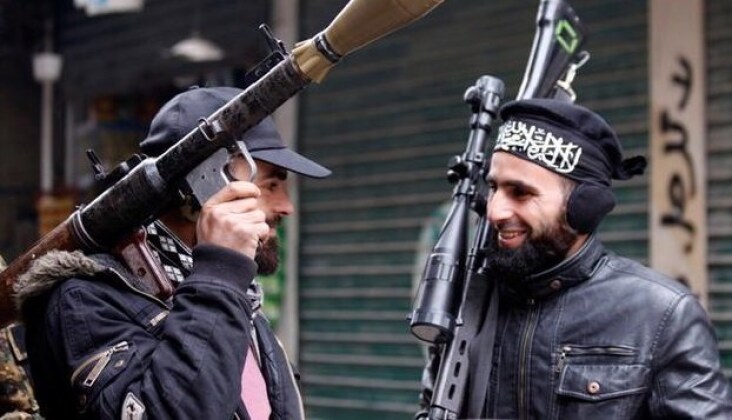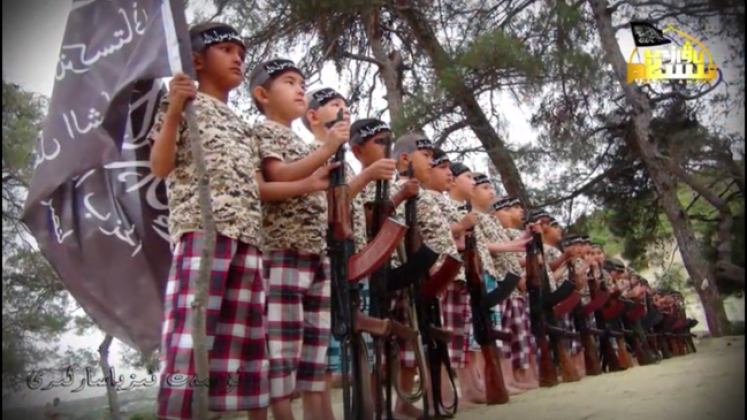News
Iranian Missile Strike on Chinese Uyghur Militants Highlights Common Terror Threat to Tehran and Beijing
The Iranian Revolutionary Guard Corps on January 15, 2022 launched the longest ranged ballistic missile strike in its history with an attack on Turkestan Islamic Party (TIP) Islamist group targets in northern Syria’s Idlib governate. The corps is an elite branch of the Iranian Armed Forces responsible for the large majority of overseas operations, including counterinsurgency, and has control over the country’s entire ballistic missile arsenal. Strikes on Idlib were carried out near simultaneously to missile attacks on what Tehran alleged was an Israeli espionage centre in the Iraqi city of Erbil, and the following day strikes on the Baloch Islamist militant group Jaish Al Dal based in Pakistan which had claimed responsibility for the 2019 Khash–Zahedan suicide bombings in Iran’s Baluchestan province. While the justification given for each of the attacks differed significantly, the attack on militants in Syria served to highlight the ongoing role which the TIP has played in the Middle East and the common security challenges it has posed both to regional states and to its primary state adversary China.
Much like Al Qaeda and the Islamic State, the Turkestan Islamic Party (TIP) is designated as a terrorist organization by the United Nations – a designation approved by all UN Security Council members at the time. This means its status as a terror group is internationally recognised in contrast to the unilateral designations often made by individual states against groups such as Hamas, designated terrorists by multiple Western countries, or the Khalistan movement designated terrorists by India. The TIP’s stated objective is the creation of an Islamic caliphate in China’s westernmost province of Xinjiang and much of Central Asia, and the bulk of its members accordingly hail from the Uyghur Muslim minority in China. This makes it one of just two major international terrorist organisations of Chinese origin alongside the closely affiliated East Turkestan Islamic Movement. The TIP currently commands for the bulk of the Uyghur fighters in Syria numbers of which estimated at between 5000 and tens of thousands.

Three primary factors led the Turkistan Islamic Party into conflict with the Iranian state and to select Syria’s Idlib governate as its primary base of operations. A primary factor has been its diminished ability to operate in China as security measures in Xinjiang improved considerably from the early 2010s after multiple terrorist attacks claimed hundreds of lives the previous decade. Uyghur Islamists simultaneously received considerable support from the Turkish state, which in the 2000s and 2010s widely provided travel documents, fake Turkish passports and military training. The outbreak of a wider insurgency in Syria from 2011, which received extensive Turkish state backing including the embedding of Turkish special forces within Islamist militias and provision of air and artillery support by Turkish military units, resulted in the creation of a safe haven for transnational jihadists to operate across much of the country. With Iran having played a leading role in supporting Syrian counterinsurgency efforts from the early 2010s, Iranian-backed militia groups, advisors and combat aviation assets frequently clashed with Turkestan Islamic Party forces among many other Islamist forces such as the Al Qaeda affiliated Al Nusra front which was also supported by the Turkish State.
As Syrian counterinsurgency efforts increasingly began to reduce the area under the control of Islamist groups from 2016, by the end of the decade the Idlib governate remained the only major stronghold of the Turkestan Islamic Party, Al Nusra and other jihadist groups. Straddling the Turkish border, the governate’s proximity to Turkey allowed fresh personnel and supplies to continuously flow into the territory. U.S. envoy to the coalition fighting the Islamic State Brett H. McGurk accordingly highlighted in 2017 that “Idlib Province is the largest Al Qaeda safe haven since 9/11,” with the territory otherwise described as an area of “uncontested” control by Al Qaeda linked groups, a “jihadist factory,” and “the last Islamist rebel bastion in Syria” which was sustained by Turkish state protection.

A joint effort by Syrian government forces with Iranian and Russian support to subdue insurgents in Idlib from January 2020 notably failed after Turkey launched a large scale military intervention which included shooting down Syrian government aircraft deep within their own airspace to provide air cover to militias on the ground. Militants from the Turkistan Islamic Party played a major role in these clashes, taking a significant toll on the Syrian Army and gaining a reputation as a particularly effective fighting force among jihadist groups in the area. Reports of significant Turkish Army casualties resulting from Russian air strikes on the headquarters of Islamist militias were among the factors indicating the extent of Turkish support for the insurgents on the ground, which pitted Iran as a leading strategic partner of Syria directly against the Turkistan Islamic Party and other groups backed by Ankara.
On an ideological level, as an extremist fundamentalist group from the Sunni branch of Islam the TIP has supported ethnic cleansing of Shiite Muslims – a minority in Syria but the majority in Iran – which has made conflict with Tehran part of a holy war for the militants. Idlib has itself seen an ethnic cleansing of its previous multitude of religious minorities by the TIP and affiliated groups, highlighting their vision for a purely Sunni caliphate and thus the threat to Iran and by extension China itself should their power be left unchecked. As summarised by Executive Director of the Middle East Center for Reporting and Analysis, Jerusalem-based journalist Seth J. Frantzman, Turkish-based militants in Idlib “spend their time attacking local people and killing minorities,” and as a result “religious minorities have all been removed from an area that was once diverse.” Counterterrorism researchers have also highlighted efforts are underway the Turkish state to ethnically cleanse Kurdish ethnic minority areas of northern Syria by encouraging their resettlement by the families of Uyghur fighters.

For the TIP joining the war effort in the Middle East has allowed the organisation to access considerable resources both through Turkey and through cooperation with other Islamist groups. Alongside Iran and Syria, the militants have also consistently targeted Russian military forces in Syria, an example being their reported plans alongside Al Nusra in November 2022 to attack Moscow’s primary forward operating base in the region Khmeimim Airbase located near Idlib in Syria’s Latakia governate. Gaining power and influence in the Middle East, the TIP’s primary goal remains a holy war against China to establish a caliphate Xinjiang, where much as in Idlib ethnic cleansing would be expected to ensue. As summarised by one militant in Syria who spoke to the Associated Press summarised 2017: “We didn’t care how the fighting went or who [Syrian President Bashar Al] Assad was. We just wanted to learn how to use the weapons and then go back to China.”
The extent of the terrorist threat China faces in future remains heavily determined by the success of regional actors such as Iran, with which Beijing has built increasingly close security ties, in containing and eventually destroying the power base the TIP has built. The Iranian missile strikes on the Chinese origin militants thus highlighted how participation of transnational terrorist organisations could give seemingly regional conflicts truly global implications, with the Turkestan Islamic Party posing a security threat to both Beijing and Tehran as well as to Moscow and Damascus. It also draws attention to the continued role of the Turkish state in maintaining Idlib as a safe haven for transnational jihadists from regions far beyond the Middle East, many of them from both Arab and Central Asian Turkic countries over which Ankara has long sought to extent an influence. The attack is not only expected to further ingratiate Iran’s Revolutionary Guard Corps with Beijing, but also potentially spur a further increase in counterterrorism cooperation as part of a broader trend towards strengthening strategic and economic ties between the two countries.
Much of the information in this article was researched using the book World War in Syria: Global Conflict on Middle Eastern Battlefields by international geopolitics and security scholar A. B. Abrams, which focuses on the roles played by foreign state and non-state actors such as Iran, Turkey, China and the Turkestan Islamic Party on both sides in the ongoing conflict.












